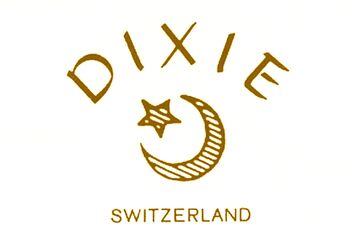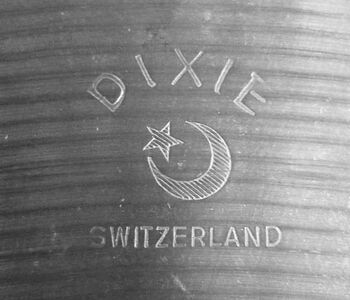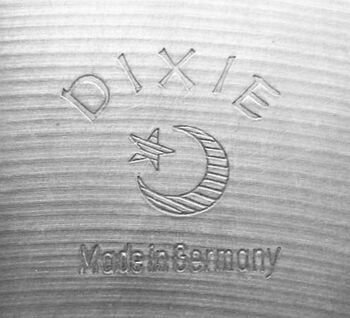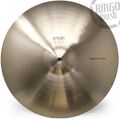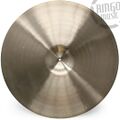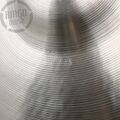Difference between revisions of "Paiste Dixie"
m |
|||
| (9 intermediate revisions by 2 users not shown) | |||
| Line 1: | Line 1: | ||
__NOEDITSECTION__ | __NOEDITSECTION__ | ||
==Dixie== | ==Dixie== | ||
| − | [[File:Dixie logo.jpg|thumb|right| | + | [[File:Dixie logo brn.jpg|thumb|right|350px|Dixie logo]] |
<div style="float:right">__TOC__</div> | <div style="float:right">__TOC__</div> | ||
| − | [[File:Dixie swiss.jpg|thumb|right| | + | [[File:Dixie swiss.jpg|thumb|right|350px|Dixie Swiss stamp]] |
| − | [[File:Dixie germany.jpg|thumb|right| | + | [[File:Dixie germany.jpg|thumb|right|350px|Dixie German stamp]] |
| − | [[File:Dixie pearl logo.jpg|thumb|right| | + | [[File:Dixie pearl logo.jpg|thumb|right|350px|Dixie with Pearl logo]] |
| − | '''Introduction:''' | + | '''Introduction:''' 1963/64<br> |
'''Discontinued:''' 1978<br> | '''Discontinued:''' 1978<br> | ||
| − | '''Background:''' The Dixie was introduced | + | '''Background:''' The Dixie was introduced in about 1963 as a lower-priced [[Identify_Your_Paistes#Nickel Silver|NS12-Nickel Silver]] series below the Stambul, (the [http://www.cymbal.wiki/wiki/Paiste_Zilko| Standard] was the predecessor to the Dixie, pre 1963).<br> |
| − | + | First known Paiste Dixie advert in the U.S. was in the "PTM" (piano tuner) magazine: Jan-June 1965, likely printed in 1964 (see below). | |
| − | The switch to B8 came during the "the great B8 shift of 1971" where | + | The switch to B8 came mostly during the "the great B8 shift of 1971" where Paiste's lower lines were switched from NS12 to B8. We have found that the switch to B8 didn't happen overnight, many leftover NS12 Dixies were given full ink stamps starting in 1972 so they are hard to tell apart from the B8 versions.<br> |
| − | Research shows that | + | Starting in about 1966, the Dixie was relabeled and sold in U.S. by Ludwig as the "Stanople". Around 1971/72, Ludwig unceremoniously dumped Paiste as a supplier with out notice, there were many leftover NS12 and B8 Stanople's relabeled as Dixies (see example below!) and sold off as late as '72 or '73.<br> |
| − | Dixie was one of the Paiste lines distributed in Japan by Pearl (see logo on the right). These cymbals have a different emboss that includes the Pearl logo. | + | *Research shows that the Swiss factory put serial numbers on the lower lines in 1972 and 1973 (at least some of the time) and then stopped this practice in very early 1974. |
| − | Arbiter Zilkos were most likely rebranded NS12 Dixies based on time frame and available sizes. | + | *Dixie was one of the Paiste lines distributed in Japan by Pearl (see logo on the right). These cymbals have a different emboss that includes the Pearl logo. |
| − | The Dixie was also imported into Italy by Sisme with an added red ink stamp and High Performance included in the emboss logo.<br> | + | *Arbiter Zilkos were most likely rebranded NS12 Dixies based on time frame (mid to late 60's) and available sizes. |
| − | Leftover Dixie | + | *The Dixie was also imported into Italy by Sisme with an added red ink stamp and High Performance included in the emboss logo.<br> |
| − | + | *In 1977/78, Leftover Dixie stock was relabeled and ink stamped as 404's when Paiste changed up its mid-level B8 lines from Dixie and Stambul to 404 and 505.<br> | |
| − | '''Alloy:''' [[Identify_Your_Paistes#Nickel Silver|NS12-Nickel Silver]] (' | + | '''Alloy:''' [[Identify_Your_Paistes#Nickel Silver|NS12-Nickel Silver]] ('63 - '71ish) - [[Identify_Your_Paistes#B8_.282002.29_Alloy|CuSn8]] (Also known as <b>"2002 Bronze"</b>) ('71-'78)<br> |
'''Quality:''' Entry-level series<br> | '''Quality:''' Entry-level series<br> | ||
'''Production:''' These cymbals were fully hammered into shape, not stamped, the same production techniques were used as on the top line cymbals.<br> | '''Production:''' These cymbals were fully hammered into shape, not stamped, the same production techniques were used as on the top line cymbals.<br> | ||
'''Applications:''' Dixie cymbals are made with the usual Paiste precision and care. This line offers excellent sound and response. | '''Applications:''' Dixie cymbals are made with the usual Paiste precision and care. This line offers excellent sound and response. | ||
Ideal for the beginner or student, who wants a quality product without a big investment.<br> | Ideal for the beginner or student, who wants a quality product without a big investment.<br> | ||
| − | |||
'''Sound:''' B8 Dixies were similar in construction, sound and quality to the later 404's that replaced them in 1978.<br> | '''Sound:''' B8 Dixies were similar in construction, sound and quality to the later 404's that replaced them in 1978.<br> | ||
| − | <b>Lineup as per | + | <b>Lineup as per 1963/64 Paiste Catalog and circa 1966 Paiste Catalog (First generation NS12 Dixies) |
These first gen. NS12 Dixies were listed and inked stamped as being of a "standard" weight:</b> | These first gen. NS12 Dixies were listed and inked stamped as being of a "standard" weight:</b> | ||
| Line 36: | Line 35: | ||
* '''[[Paiste Hi-Hat|Hi-Hat]] - [[Paiste Dixie 13" Hi-Hat|13"]] [[Paiste Dixie 14" Hi-Hat|14"]] [[Paiste Dixie 15" Hi-Hat|15"]] [[Paiste Dixie 16" Hi-Hat|16"]]<br> | * '''[[Paiste Hi-Hat|Hi-Hat]] - [[Paiste Dixie 13" Hi-Hat|13"]] [[Paiste Dixie 14" Hi-Hat|14"]] [[Paiste Dixie 15" Hi-Hat|15"]] [[Paiste Dixie 16" Hi-Hat|16"]]<br> | ||
| − | ==== Medium | + | ==== Medium Thin ==== |
| − | * '''[[Paiste Medium Thin Crash| | + | * '''[[Paiste Medium Thin Crash|Medium Thin]] - [[Paiste Dixie 10" Medium Thin|10"]] [[Paiste Dixie 11" Medium Thin|11"]] [[Paiste Dixie 12" Medium Thin|12"]] [[Paiste Dixie 13" Medium Thin|13"]] [[Paiste Dixie 14" Medium Thin|14"]] [[Paiste Dixie 15" Medium Thin|15"]] [[Paiste Dixie 16" Medium Thin|16"]] [[Paiste Dixie 18" Medium Thin|18"]] [[Paiste Dixie 20" Medium Thin|20"]] [[Paiste Dixie 22" Medium Thin|22"]]<br> |
| − | ==== Crash | + | ==== Crash Ride ==== |
| − | * ''' [[Paiste Crash/Ride|Crash | + | * ''' [[Paiste Crash/Ride|Crash Ride]] - [[Paiste Dixie 18" Crash/Ride|18"]] [[Paiste Dixie 20" Crash/Ride|20"]] [[Paiste Dixie 22" Crash/Ride|22"]]<br> |
==== Marching ==== | ==== Marching ==== | ||
| Line 63: | Line 62: | ||
<gallery> | <gallery> | ||
| − | File:Paiste | + | File:Paiste 1963 catalog.jpg|possibly 1st. catalog listing (1963ish?) |
| − | File:Paiste | + | File:Paiste 1963 catalog a.jpg| back cover |
| + | File:63 catalog 20.jpg| 1963ish catalog, back cover | ||
| + | File:Paiste 1963 catalog 1.jpg| 1964ish (602 logo change)catalog back cover | ||
| + | File:PTM Super Dixie ad.jpg|1st. U.S. advert 1965 | ||
File:Paiste 63 catalog 2.jpg| '65/'67 catalog | File:Paiste 63 catalog 2.jpg| '65/'67 catalog | ||
File:Paiste Catalog 1970.jpg| 1970 catalog | File:Paiste Catalog 1970.jpg| 1970 catalog | ||
| Line 72: | Line 74: | ||
File:Paiste-Dixie-Medium-Thin-Crash-14- 57.jpg|Dixie with "high performance" stamp | File:Paiste-Dixie-Medium-Thin-Crash-14- 57.jpg|Dixie with "high performance" stamp | ||
File:Dixie 404.jpg| "transition" 404 with Dixie stamp. | File:Dixie 404.jpg| "transition" 404 with Dixie stamp. | ||
| − | File:Dixie ns12 standard.jpg|Pre ' | + | File:Dixie ns12 standard.jpg|Pre '71 NS12 Dixie labeled as "standard" weight |
| + | File:Dixie set.jpg|full set of B8 Dixies | ||
| + | File:20 404 dixe cr ride.jpg| Dixie relabeled as a 404 | ||
| + | File:MEDHEAVY DIXIE HI HAT 14.jpg|Ludwig Stanople restamped as a Dixie | ||
| + | File:Vxjosztp0csgzxvgzbbl.jpg| new old stock SISME dixie | ||
| + | File:N4pj9hrjlyphxhdsf75a.jpg|bottom view | ||
| + | File:Lyxwll9auaagmrsuznzz.jpg|SISME dixie early 1972 serial number | ||
| + | File:7248264 1654341326.jpg|SISME emboss | ||
</gallery> | </gallery> | ||
Latest revision as of 17:36, 4 November 2023
Dixie
Introduction: 1963/64
Discontinued: 1978
Background: The Dixie was introduced in about 1963 as a lower-priced NS12-Nickel Silver series below the Stambul, (the Standard was the predecessor to the Dixie, pre 1963).
First known Paiste Dixie advert in the U.S. was in the "PTM" (piano tuner) magazine: Jan-June 1965, likely printed in 1964 (see below).
The switch to B8 came mostly during the "the great B8 shift of 1971" where Paiste's lower lines were switched from NS12 to B8. We have found that the switch to B8 didn't happen overnight, many leftover NS12 Dixies were given full ink stamps starting in 1972 so they are hard to tell apart from the B8 versions.
Starting in about 1966, the Dixie was relabeled and sold in U.S. by Ludwig as the "Stanople". Around 1971/72, Ludwig unceremoniously dumped Paiste as a supplier with out notice, there were many leftover NS12 and B8 Stanople's relabeled as Dixies (see example below!) and sold off as late as '72 or '73.
- Research shows that the Swiss factory put serial numbers on the lower lines in 1972 and 1973 (at least some of the time) and then stopped this practice in very early 1974.
- Dixie was one of the Paiste lines distributed in Japan by Pearl (see logo on the right). These cymbals have a different emboss that includes the Pearl logo.
- Arbiter Zilkos were most likely rebranded NS12 Dixies based on time frame (mid to late 60's) and available sizes.
- The Dixie was also imported into Italy by Sisme with an added red ink stamp and High Performance included in the emboss logo.
- In 1977/78, Leftover Dixie stock was relabeled and ink stamped as 404's when Paiste changed up its mid-level B8 lines from Dixie and Stambul to 404 and 505.
Alloy: NS12-Nickel Silver ('63 - '71ish) - CuSn8 (Also known as "2002 Bronze") ('71-'78)
Quality: Entry-level series
Production: These cymbals were fully hammered into shape, not stamped, the same production techniques were used as on the top line cymbals.
Applications: Dixie cymbals are made with the usual Paiste precision and care. This line offers excellent sound and response.
Ideal for the beginner or student, who wants a quality product without a big investment.
Sound: B8 Dixies were similar in construction, sound and quality to the later 404's that replaced them in 1978.
Lineup as per 1963/64 Paiste Catalog and circa 1966 Paiste Catalog (First generation NS12 Dixies) These first gen. NS12 Dixies were listed and inked stamped as being of a "standard" weight:
Jazz, Hi Hats and Marching
Lineup as per July, 1970 Paiste Price Sheet and 1974 Paiste Catalog (Second generation NS12 and B8 Dixies):
Hi-Hats
Medium Thin
Crash Ride
- Crash Ride - 18" 20" 22"
Marching
Lineup as per 1976 Paiste Catalog (this applies to late period Germany-made B8 Dixies only - Swiss factory carried on with second listing of sizes and types):
Crash/ride**
Hi-Hats**
Marching**
(**)The above lineup probably started in 1975 and runs until the end of production and replacement by 404. It is unclear whether the smaller sizes that were formerly exclusive to the Medium Thin designation (10" - 16"), now discontinued, were made heavier to better "qualify" as Crash Rides or whether they stayed the same weight and were just stamped differently in an effort to simplify things as production wound down. German Dixies from 1975 on got black type stamp ink instead of the earlier red.
Non-Catalog
Information from: Paiste catalogs Todd Little, Dan Garza
Return to the Paiste Series Portal
Return to the Paiste Cymbal Type Portal
